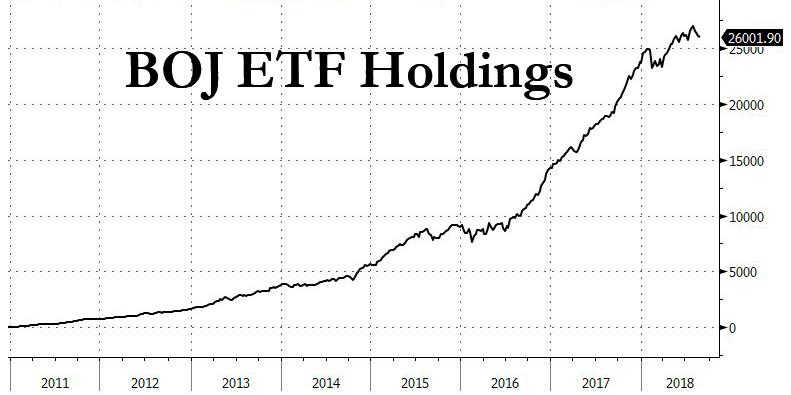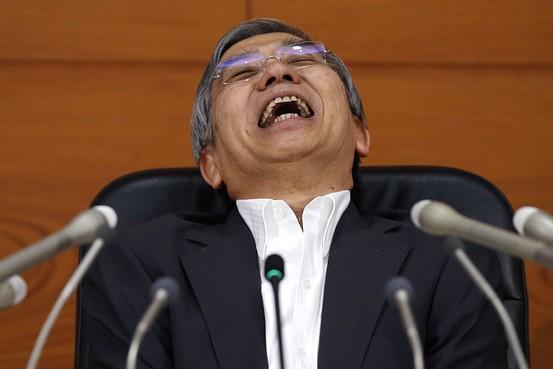While traders continue to obsess over daily “China trade deal optimism” headlines, Japan’s central bank is quietly nationalizing its entire market.
The last time we looked at how much of the stock market the Bank of Japan controls, we found that as of June, Kuroda’s central bank owned a stunning 75% of all Japanese ETFs as the central bank keeps buying stocks under its ultraloose monetary policy. Perhaps more importantly, as of mid-2018, the Japanese central bank has also become a major shareholder in nearly 40% of listed companies. According to Nikkei calculations, the bank was one of the top 10 shareholders in 1,446 listed companies out of 3,735.
Fast forward to today, when according to the latest BOJ holdings update following even more ETF purchases, the BOJ held over 28 trillion yen ($250 billion) in ETFs as at the end of March, or 4.7% of the total market capitalization of the first section of the Tokyo Stock Exchange. This, of course, in addition to the BOJ’s trillions in Japanese JGB holdings, which at last check were over 100% of GDP and 43% of all outstanding.
It gets better. According to Nikkei calculations, not only has the BOJ also become the top shareholder in 23 companies, including Nidec, Fanuc and Omron, through its ETF holdings, but as of Q1, it was among the top 10 holders for 49.7% of all Tokyo-listed enterprises.
In other words, the BOJ has gone from being a Top 10 holder in 40% Japanese stocks last March, to 50% just one year later.
But wait, there’s more: as the Nikkei further calculates, the Bank of Japan will overtake a state-run pension fund – the world’s largest – as the top shareholder in Tokyo-listed companies as early as 2020, even as concerns rise regarding the central bank’s outsize role in the nation’s capital market. Assuming that the bank maintains its current target of 6 trillion yen (just over $53BN at prevailing rates) in new purchases a year, its holdings would expand to about 40 trillion yen by the end of November 2020. This would place it above the Government Pension Investment Fund’s TSE first-section holdings of more than 6%.
In other words, Japan’s central bank will soon be the biggest individual owner of Japanese stocks. Somewhere Brezhnev is spinning in his grave.
As the Nikkei poetically puts it, “Japan’s capital market used to be characterized by a complex web of cross-shareholdings, with banks and insurers playing the leading role over retail investors. This was followed by a period when foreign investors rapidly expanded their presence.” Now, the BOJ is ushering in a new age for the Japanese market: the age of creeping nationalization, where a monetary authority is becoming the biggest owner of corporate assets using money printed out of thin air to fund the purchases.
The central bank is snapping up stocks – both domestically and internationally – to “keep the market stable” and raise inflation toward its 2% goal. “We will support forward-looking economic activity by companies and households,” BOJ Gov. Haruhiko Kuroda told lawmakers Tuesday.
Amusingly, there was another typically Japanese “insert foot in mouth” moment during Kuroda’s speech in parliament when he first said that the purchases of ETFs is “for the stability of stock prices”, later correcting himself that is was “to achieve price stability” admitting that saying the purchase is for the stability of stock prices would indicate that the central bank is trying to boost or otherwise influence the level of stock prices.
Which, of course, is precisely what it is doing, but since that would suggest price discovery no longer exists, Kuroda had to promptly retract his own statement… which incidentally was absolutely true.
Meanwhile, as the Nikkei cautions, significant side effects could come from having the BOJ, which is not an investor simply chasing high returns, as the top player in the equities market.
Others agree: the bank’s ETF program “is eroding market discipline as companies are rewarded simply for being in major market indexes, rather than for having new business strategies or offering more dividends,” the OECD said in a country survey published Monday, citing a previous Nikkei report.
“We can try to motivate employees through stock-based compensation, but that’s not much of an incentive to do better when we know share prices likely won’t fall because of the BOJ’s purchases,” an executive said, hitting the hammer squarely on the head in explaining why global productivity has collapsed in a world where central banks have backstopped all prices.
There are even more serious considerations as the BOJ bravely pursue its goal of nationalizing the entire stock market: a drop in share prices, which would squeeze the central bank’s capital, could also erode confidence in the yen. “If the Nikkei Stock Average falls below about 18,000, the market value of the ETF holdings would fall below their book value,” according to Deputy Gov. Masayoshi Amamiya. What that would mean for the BOJ’s balance sheet is unclear, but the bank would counter that it could just print more money at that point.
What is most shocking, however, is that there are allegedly reputableand respected economists, who look at this absolutely insane Ponzi arrangement – which is straight out of 1960s USSR – in which money printed out of thin air is used to set asset prices, and find nothing wrong with it.
via ZeroHedge News http://bit.ly/2PfEVAL Tyler Durden

